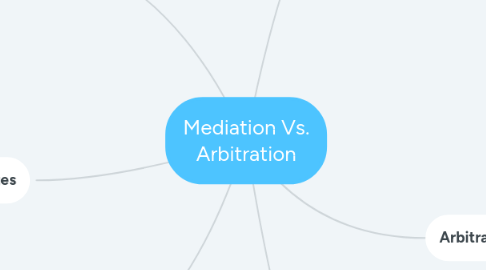Mediation Vs. Arbitration
by Helen Morris


1. Mediation
1.1. According to Merriam Webster (2019) mediation is defined as a means of resolving disputes outside of the judicial system by voluntary participation in negotiations structured by agreement of the parties usually conducted under the guidance and supervision of a trained intermediary.
1.2. Parties in dispute decide on terms to resolve the dispute. Often times, because both parties agree on terms, neither party is left feeling unjustly treated, whether real or perceived.
1.3. The cost of mediation in comparison to arbitration is much less for all parties involved.
1.3.1. The mediation process is often much less time consuming than formal arbitration.
1.4. The mediation process is often much less time consuming than formal arbitration.
2. Mediation Disadvantages
2.1. Lack of formal rules in comparison to arbitration. As such, parties may not be able to come to a compromise if they are not willing to consider the opposing views.
2.1.1. The parties may not be able to come to agreeable terms, inevitably leading to litigation proceedings. In such cases, the dispute process is drawn out.
2.2. Both parties in dispute may not be truthful during mediation. Discovery, witnesses, and evidence are not afforded in mediation proceedings.
3. Arbitration
3.1. While mediation is often a non-binding process, arbitration is binding. Therefore, the decision is final.
3.2. While mediation is often conducted by one third party, arbitration usually is determined by majority vote. However, it is a more simplified process than having to go to trial.
3.3. Disputing parties have a chance for discovery, gathering evidence to present.
3.4. According to Legaldictionary.com (2019), arbitration is defined as the submission of a dispute to an unbiased third person designated by the parties to the controversy, who agree in advance to comply with the award - a decision to be issued after a hearing at which both parties have an opportunity to be heard.
4. Mediator Qualifications
4.1. Although mediation qualifications vary slightly from state to state, and in civil vs. family law areas, the basic qualifications for workplace mediators are similiar.
4.2. Must be familiar with EEOC laws and processes including disparate treatment, adverse impact, harassment, and reasonable accommodation.
4.3. Must be familiar with remedies available including compensatory damages and back pay.
4.4. Must meet minimum professional training, usually between 20 and 40 hours of basic mediation skills training.
4.5. Must have completed minimum co-mediations with qualified mediator.
4.6. References from qualified mediators and/or professional trainers.
5. Arbitrator Qualifications
5.1. According to the American Arbitrators Association (2019), arbitrators are required to obtain extensive training, education, and professional experience. In addition to having the ability to remain neutral, manage a hearing, and evaluate various legal processes, an arbitrator must meet additional mandatory requirements.
5.2. Minimum 10 years professional and/or legal practice as well as experience in alternative dispute resolution.
5.3. educational degrees and licenses in field of expertise
5.4. Letters of recommendation
5.5. Membership in professional association(s).
5.6. Honors, awards, citations, and/or other relevant experience or accomplishments.
6. Arbitration Disadvantage
6.1. While less costly than other legal options, it is much more expensive in comparison to mediation.
6.1.1. There is no appeals process in arbitration. Therefore, the decision of the arbitrator is final.
